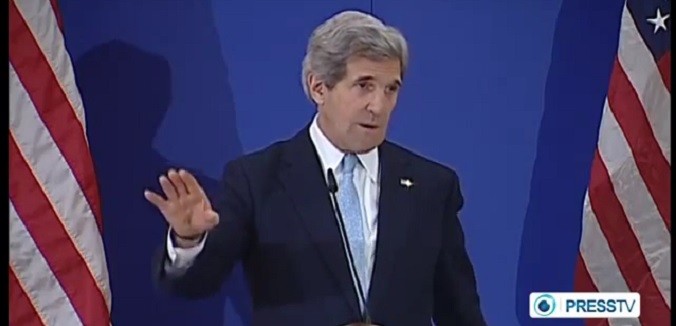As the Palestinians were finalizing the formation of their unity government in recent days, U.S. lawmakers were discussing the legal ramifications of continued American aid to the Palestinian Authority. Secretary of State John Kerry told PBS last Thursday that Israel’s stance toward an expected unity government between the rival Palestinian Hamas and Fatah factions – which Kerry described as one in which Jerusalem is “waiting to see what happens” – was “an appropriate thing [for the Israelis] to be doing,” as reports emerged that American lawmakers from both parties were preparing to suspend assistance to the Palestinian Authority (PA) should such a consensus cabinet take power.
“My reality check tells me that neither side is going to be able to live for the long haul with the status quo without serious problems evolving. So eventually, there’ll have to be some discussion about some management of that process,” he told PBS’s Gwen Ifill. “Whether it’s a full-blown peace process or whether it’s individual steps or not, I don’t know, but I know this: that Israel’s security, which is paramount for the United States and for Israelis, will be better protected by finding a road ahead; Palestinian rights and ability to have a state can only come through some kind of political process; and both of those aspirations are what govern life ultimately in that region and the hopes of that region.”
Israeli Deputy Defense Minister Danny Danon conveyed details from conversations he had with “a number of [Congressional] committee heads” who expressed their readiness to enforce blackletter law stretching back to the 2006 Palestinian Anti-Terrorism Act, under which American assistance to the PA is to be cut to any government “that results from an agreement with Hamas and over which Hamas exercises undue influence.”
The stances are not unexpected. State Department Spokesperson Jen Psaki had spent her first press briefing after the Palestinian unity announcement took shape repeatedly declaring that Israel could not be expected to negotiate with a government involving parties committed to its destruction.
Criticism from the Hill was even more emphatic, and Al Monitor went so far as to suggest that the Fatah-Hamas deal was potentially the “last straw for Congress on U.S. aid to [the] Palestinians.”
“The Administration must halt aid to the Palestinian Authority and condition any future assistance as leverage to force Abu Mazen [Mahmoud Abbas] to abandon this reconciliation with Hamas and to implement real reforms within the PA,” Ros-Lehtinen, who chairs the House Foreign Affairs panel on the Middle East, said in a statement. “U.S. law is clear on the prohibition of U.S. assistance to a unity Palestinian government that includes Hamas, a designated Foreign Terrorist Organization, and President [Barack] Obama must not allow one cent of American taxpayer money to help fund this terrorist group.”
Her Democratic counterpart on the subcommittee, Ted Deutch of Florida, issued a similar warning. “President Abbas now stands at a pivotal crossroad — does he want peace with Israel or reconciliation with Hamas?” Deutch said. “Be certain that the Palestinian Authority will face significant consequences if a unity government is formed that includes terrorist members of Hamas.”
PA President Mahmoud Abbas has sought in recent days to downplay the extent to which Hamas will gain prominence or influence in the wake of the pact’s implementation. Those efforts have met with uneven success. The New York Times headlined its Friday story on recent developments as “Abbas Seeks a New Government That Would Seal Alliance With Hamas.”
[Photo: Press TV / YouTube]




